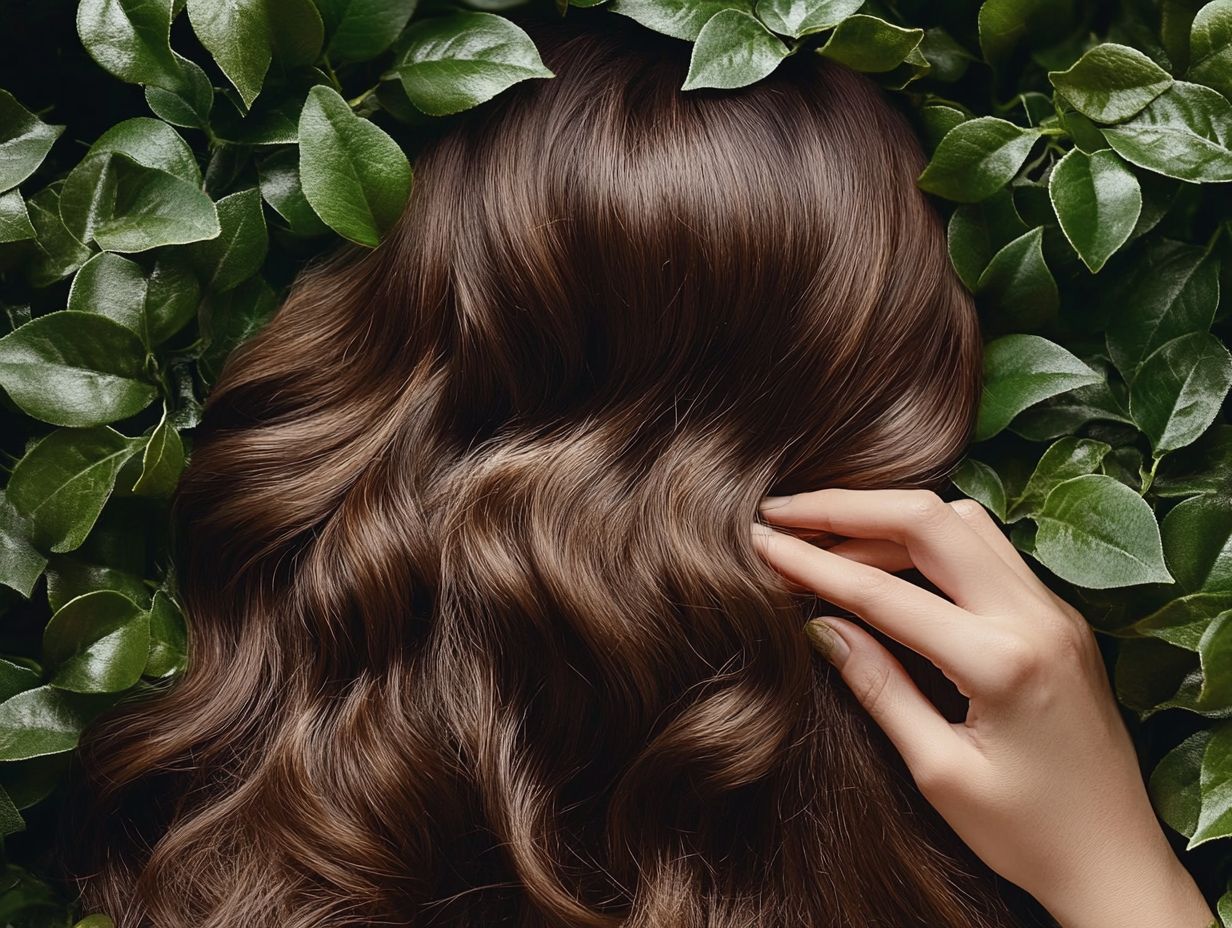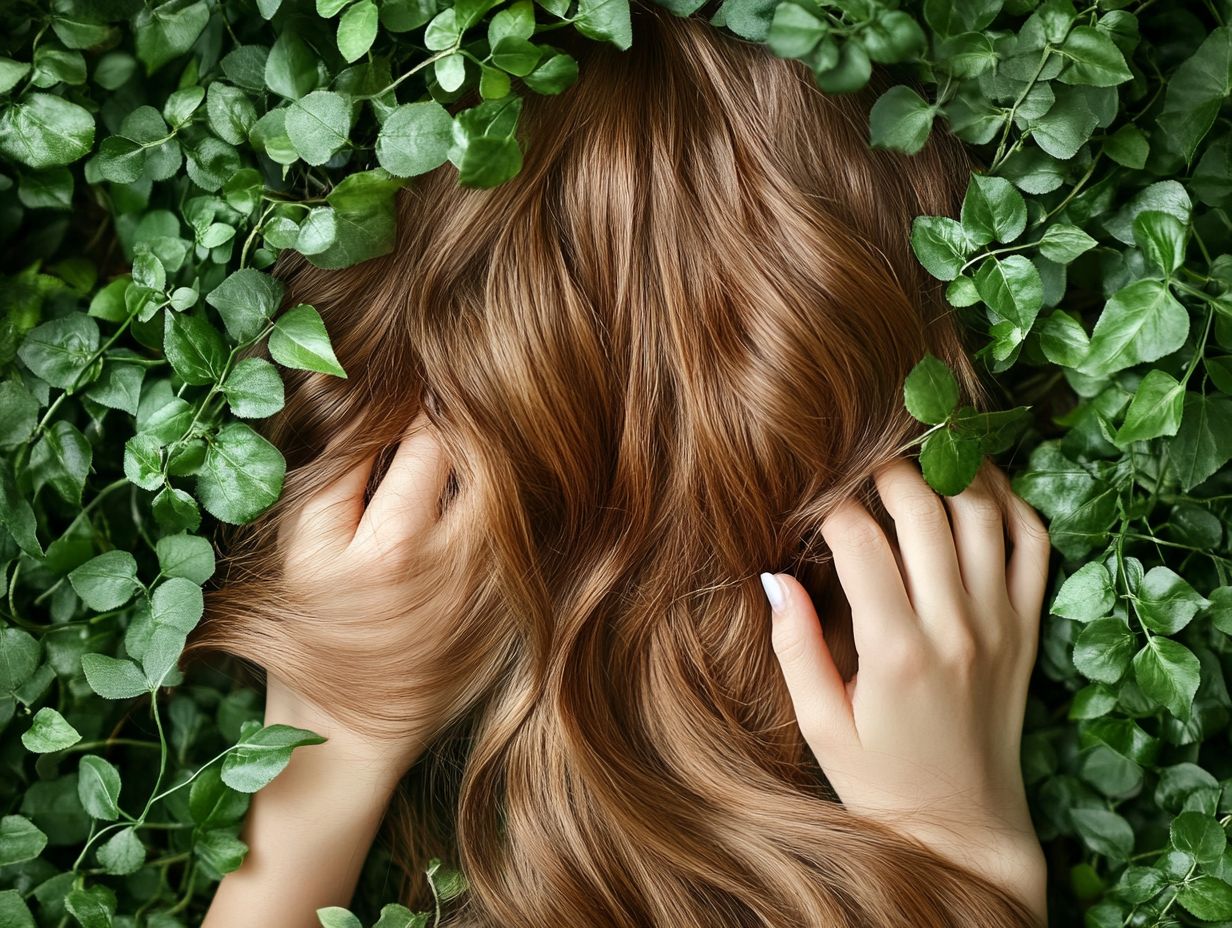Hair growth is a fascinating and complex process influenced by various factors, including diet, hormonal changes, and lifestyle choices.
This article explores the intricacies of the hair growth cycle, identifies key elements that can either boost or hinder growth, and shares effective strategies to promote healthier, stronger hair.
Additionally, common myths surrounding hair growth will be addressed to help you make informed decisions on your hair care journey.
Dive in to discover how to achieve the luscious locks you’ve always wanted!
Table of Contents
Key Takeaways:

- Eat a balanced diet with enough protein, vitamins and minerals to support hair growth.
- Reduce stress levels and practice a healthy lifestyle to promote a healthy hair growth cycle.
- Incorporate scalp massages and use hair care products specifically designed to strengthen and nourish hair for faster and stronger growth.
Understanding Hair Growth
Understanding hair growth is crucial for individuals seeking to enhance their hair health and address prevalent issues such as hair loss or damage. The process encompasses the growth cycle of hair follicles, which is affected by various factors including nutrition, genetics, and overall health.
A comprehensive understanding of hair growth enables individuals to implement effective treatments and practices, such as maintaining adequate hydration and protein intake, as well as utilizing targeted supplements like biotin and collagen peptides to support a balanced diet.
The Hair Growth Cycle
The hair growth cycle comprises several distinct phases: anagen, catagen, and telogen, each of which plays a crucial role in the overall health and appearance of hair. For tips on enhancing this process, check out How to Grow Your Hair Faster and Stronger.
Understanding these stages is essential for maintaining vibrant hair and a healthy scalp. The anagen phase, recognized as the active growth stage, can last anywhere from two to six years, influenced by genetic factors and overall health, during which the follicles are nurtured to encourage the development of long, thick strands.
Subsequently, the catagen phase serves as a transitional period lasting a few weeks, during which hair follicles undergo shrinkage, indicating the onset of rest. The telogen phase represents a resting stage that typically lasts around three months, during which shedding occurs. This phase underscores the importance of scalp care and targeted treatments to stimulate regrowth and maintain the harmony of the growth cycle.
It is evident that utilizing appropriate products to nurture the scalp can optimize hair conditions throughout these phases.
Factors That Affect Hair Growth

Numerous factors influence hair growth, including diet and nutrition, hormonal imbalances, and stress levels. Each of these elements can contribute to hair loss or impede the process of hair growth.
Diet and Nutrition
A balanced diet that includes an adequate supply of hair vitamins and sufficient protein is crucial for promoting hair growth and maintaining overall hair health.
Incorporating specific nutrients such as biotin, zinc, and vitamins A, C, and E can significantly enhance the vitality of hair. Foods such as spinach, nuts, seeds, and fatty fish not only provide these essential vitamins but also deliver vital omega-3 fatty acids that nourish the scalp.
Additionally, maintaining proper hydration is essential for optimal hair health, as adequate water intake facilitates nutrient transport and preserves overall hydration levels. For tips on improving your hair growth, check out this article on how to grow your hair faster and stronger.
By implementing these hair growth strategies and considering natural remedies, individuals can effectively support their hair growth journey.
Hormonal Imbalances
Hormonal imbalances, often resulting from various health conditions, can significantly affect hair growth and contribute to increased hair loss, necessitating targeted intervention and treatment. For more tips on improving hair growth, check out How to Grow Your Hair Faster and Stronger.
These hormonal fluctuations, particularly involving androgens such as testosterone and dihydrotestosterone (DHT), can lead to conditions like polycystic ovary syndrome (PCOS) and thyroid disorders, both of which are frequently linked to hair thinning. For individuals facing these challenges, a comprehensive understanding of the underlying causes is essential.
Treatment options may include medications such as spironolactone, which functions by inhibiting androgen activity, thereby fostering healthier hair growth.
Additionally, lifestyle modifications and topical treatments can provide supplementary support, enabling individuals to manage the adverse effects of hormonal changes on their hair more effectively.
Stress and Lifestyle

Stress and lifestyle choices can have a detrimental impact on hair growth, making stress reduction and the adoption of a healthier lifestyle essential for maintaining vibrant hair.
When individuals experience elevated stress levels, the body’s hormonal balance may become disrupted, often resulting in hair thinning and loss. Additionally, poor dietary habits and a lack of physical activity can impede adequate blood circulation, depriving hair follicles of vital nutrients.
To address these issues, incorporating mindfulness practices such as meditation or yoga can be advantageous. Regular exercise not only aids in stress reduction but also enhances circulation, thereby promoting healthier hair growth. Furthermore, adopting a balanced diet rich in vitamins and minerals, particularly iron and biotin, can significantly improve overall hair vitality.
Ways to Promote Hair Growth
Promoting hair growth can be accomplished through a strategic approach that includes proper hair care techniques, targeted supplementation with vitamins, and stimulating massage practices designed to enhance blood circulation to the scalp.
Proper Hair Care
Implementing a comprehensive hair care routine, which includes the use of appropriate hair products such as gentle cleansers and conditioning treatments, is essential for maintaining healthy hair and preventing damage.
Incorporating leave-in conditioners and nourishing hair masks can significantly enhance moisture levels and facilitate the repair of any existing damage. The use of sulfate-free shampoos is recommended to preserve natural oils, while regular application of heat protectant sprays is critical for individuals who frequently utilize styling tools.
These products create a protective barrier against high temperatures, thereby reducing the risk of breakage and frizz. By selecting the right combination of these fundamental products, one can not only maintain hair that appears vibrant and shiny but also ensure its resilience against daily stressors.
Supplements and Vitamins

Supplements and vitamins, including biotin, collagen peptides, and multivitamins, play a crucial role in enhancing the nutrient profile necessary for optimal hair growth.
Incorporating these essential nutrients into one’s daily routine can effectively address common concerns such as thinning hair and brittleness. Biotin, for example, is recognized for its capacity to strengthen the hair shaft, while collagen peptides supply the amino acids vital for a healthy hair structure. Multivitamins ensure that the body obtains a balanced array of vitamins and minerals, which are essential for maintaining overall hair vitality.
Additionally, omega-3 fatty acids offer significant benefits by promoting scalp health and reducing inflammation. Collectively, these supplements provide a comprehensive approach to hair health, enabling individuals to achieve thicker, fuller locks.
Scalp Massage and Stimulation
Scalp massage, often complemented with essential oils such as rosemary oil, serves as an effective method to stimulate blood circulation and promote healthier hair growth.
By gently kneading the scalp, individuals can invigorate hair follicles, potentially resulting in increased thickness and vitality of hair strands. This technique not only enhances the delivery of essential nutrients through improved blood flow but also helps alleviate stress, a known contributor to hair loss.
Incorporating oils like chamomile and peppermint can further enhance the benefits, as these oils possess nourishing properties that improve overall scalp health. Regular practice of this calming regimen may also assist in reducing tension and promoting relaxation, thereby providing a holistic approach to hair care. For more tips on enhancing your hair growth journey, check out this article on how to grow your hair faster and stronger.
Myths and Misconceptions About Hair Growth
Numerous myths and misconceptions regarding hair growth can mislead individuals in their quest for effective hair restoration and treatment options.
Separating Fact from Fiction
Separating fact from fiction regarding hair growth is essential for individuals seeking to enhance their hair care routines and effectively address hair loss.
A comprehensive understanding of the various myths surrounding hair growth can significantly influence the choices made regarding hair care products. For example, there is a common belief that frequent haircuts can accelerate hair growth; however, this assertion is not entirely accurate. Hair growth occurs at the follicle level, meaning that the rate of growth is predominantly determined by genetics and overall health, rather than the length of hair that is trimmed.
Additionally, some individuals may presume that utilizing a specific shampoo will lead to substantial hair growth overnight. While certain ingredients can promote scalp health, there is no singular product that can guarantee such results. Being informed about these misconceptions enables individuals to make more informed decisions in their pursuit of healthier hair.


